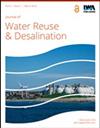Experimental studies on the effects of coagulation and adsorption as a pretreatment process on the microfiltration of oily wastewater
IF 2.3
Q2 Environmental Science
引用次数: 3
Abstract
To improve the performance of the membrane process in the treatment of oily wastewater, the combined effects of pretreatment, membrane modification, and optimization of operating parameters on the microfiltration membrane system were investigated. First, coagulation and adsorption were used as pretreatment steps. Polyaluminium chloride and ferric chloride were employed as coagulants, and granular activated carbon was used as an adsorbent. In the optimal coagulation condition (1 g/L polyaluminium chloride, pH 7.5), chemical oxygen demand (COD) was reduced by 96%, while in the optimal adsorption condition, in which large amounts of activated carbon were utilized, 48% of COD was eliminated. A membrane of polyethersulfone containing SiO2-g-polymethacrylic acid (PMAA) nanoparticles was then prepared by the non-solvent-induced phase separation method. To reduce fouling and increase the flux of the membrane, the SiO2 nanoparticles were first activated with amine groups and then PMAA was grafted onto the surface of the particles. Subsequently, the operating parameters were studied to optimize the performance of the polyethersulfone (PES)/SiO2-g-PMAA membrane using the response surface methodology method. The results indicated that the flux of the modified membrane for pretreated wastewater was 72.2% higher than that of the PES membrane and non-pretreated wastewater at an optimum pressure of 2 bar and a flow rate of 3.5 L/min.混凝吸附预处理工艺对含油废水微滤效果的实验研究
为了提高膜法处理含油废水的性能,研究了预处理、膜改性和操作参数优化对微滤膜系统的综合影响。首先,采用混凝和吸附作为预处理步骤。采用聚合氯化铝和氯化铁作为混凝剂,颗粒活性炭作为吸附剂。在最佳混凝条件(1g/L聚合氯化铝,pH 7.5)下,化学需氧量(COD)降低了96%,而在大量使用活性炭的最佳吸附条件下,COD去除了48%。采用非溶剂诱导相分离方法制备了含有SiO2-g-聚甲基丙烯酸(PMAA)纳米粒子的聚醚砜膜。为了减少污垢并增加膜的通量,首先用胺基活化SiO2纳米颗粒,然后将PMAA接枝到颗粒表面。随后,采用响应面法对操作参数进行了研究,以优化聚醚砜/SiO2-g-PMAA膜的性能。结果表明,在2巴的最佳压力和3.5L/min的流速下,改性膜对预处理废水的通量比PES膜和未预处理废水高72.2%。
本文章由计算机程序翻译,如有差异,请以英文原文为准。
求助全文
约1分钟内获得全文
求助全文
来源期刊

Journal of Water Reuse and Desalination
ENGINEERING, ENVIRONMENTAL-WATER RESOURCES
CiteScore
4.30
自引率
0.00%
发文量
23
审稿时长
16 weeks
期刊介绍:
Journal of Water Reuse and Desalination publishes refereed review articles, theoretical and experimental research papers, new findings and issues of unplanned and planned reuse. The journal welcomes contributions from developing and developed countries.
 求助内容:
求助内容: 应助结果提醒方式:
应助结果提醒方式:


